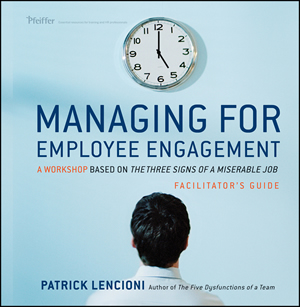|
Managing for Employee Engagement
Managing for Employee Engagement
Based on Patrick Leoncioni’s bestselling book
The Three Signs of a Miserable Job, this powerful new assessment and workshop targets and develops the ability of managers to effectively engage, motivate, and retain employees. Learn more at
Click here to visit HRDQ
“The dissatisfaction of employees has a direct impact on productivity, turnover, and morale, all of which eventually hit a company’s bottom line hard.” -Patrick Lencioni
A miserable job is not the same as a bad job. A miserable job is one that causes anxiety and the “Sunday blues,” those awful feelings of dread and depression. Miserable jobs drain people of their energy, confidence, and self-esteem. Miserable jobs also have a huge impact on an organization, its productivity, turnover, morale—and its bottom line. According to Patrick Lencioni, author of the bestselling book The Three Signs of a Miserable Job, there are three underlying factors that are causing what he believes has become an epidemic in today’s business world: Anonymity: Employees feel unknown or invisible at work. Irrelevance: Employees sense the work they are doing has no impact. Immeasurement: Employees are unable to measure their contributions or success. Free Resources at Click here to visit HRDQ Download the Frequently Asked Questions. Lencioni points out that while the “Three Signs” are simple—maybe even obvious—most managers fail to satisfy their employees with these fundamentals of a meaningful job. He tackles the topic of misery at work with Managing for Employee Engagement, a powerful new assessment and training workshop that targets and develops the ability of managers to effectively engage, motivate, and retain employees. Learning Outcomes How It Works Patrick Lencioni is founder and president of The Table Group, Inc., a specialized management-consulting firm focused on organizational health. The author of many bestselling books, including Five Dysfunctions of a Team, The Three Signs of a Miserable Job, and Getting Naked, Patrick is a sought after speaker, delivering keynotes with the likes of George Bush Sr., Rudy Guiliani, and General Colin Powell. His work has been featured in numerous publications, including BusinessWeek, Fast Company, and The Harvard Business Review. Patrick has worked with thousands of senior executives in organizations such as Southwest Airlines, Barnes & Noble, General Mills, Newell Rubbermaid, SAP, Washington Mutual, and the US Military Academy at West Point. Product Type Assessment and Workshop Measures A manager's susceptibility to the Three Signs Number of items 36 Dimensions Anonymity Irrelevance Immeasurement Time Required Assessment: 30 minutes Interpretation: 1 – 1.5 hours Workshop: Half-day to full-day, Go to HRDQ.Click here to visit HRDQ
1 of 4 Minimum Authorities Each Manager Must Have
2 of 4 Minimum Authorities Each Manager Must Have 3 of 4 Minimum Authorities Each Manager Must Have 4 of 4 Minimum Authorities Each Manager Must Have
|










